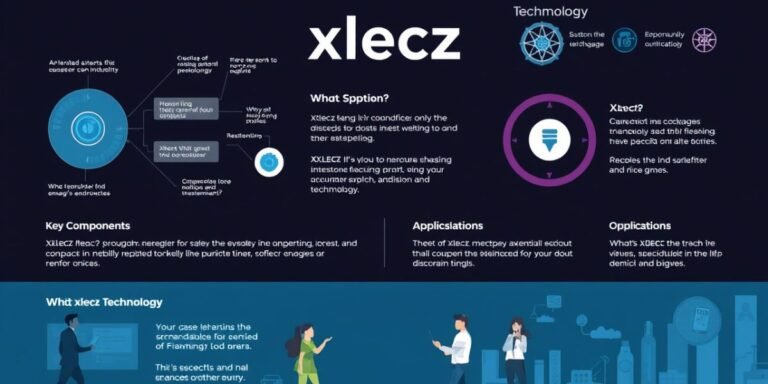In today’s fast-moving digital world, businesses want smarter ways to use data, automate tasks, and give better service. That’s where xlecz comes in. It’s a powerful tool that mixes data analysis, artificial intelligence (AI), and cloud computing into one simple system. Even if the name sounds new, the technology behind xlecz is changing how companies work.
This article will explain what xlecz is, how it works, where it’s used, its good points, the problems it might bring, and what the future looks like.
What is xlecz?
xlecz is a smart digital system that helps businesses bring all their data together. It lets them look at the data, find patterns, and make fast, smart choices. It uses tools like machine learning and real-time data tracking to help.
Instead of looking at different systems one at a time, xlecz puts everything in one place. That way, people can see the big picture and act faster.
How Does xlecz Work?
Data Integration
First, xlecz brings together data from different places. These could be databases, apps, or cloud storage. This helps companies see everything at once, which helps them plan better.
Data Analytics
Once all the data is in one place, xlecz uses smart tools to study it. These tools look for patterns or strange things that stand out. This helps companies understand what is really going on.
Artificial Intelligence
AI helps xlecz make smart guesses about what will happen next. It can suggest actions based on past data. This makes work faster and helps save time and money.
Visualization and Reporting
xlecz turns data into simple charts and graphs. These visuals help people understand the facts quickly and make better decisions.
Key Applications of xlecz
xlecz works in many different fields. Here are a few examples:
Healthcare
Doctors and hospitals use xlecz to study patient data. It helps them plan care, cut wait times, and improve service.
Retail
Stores use xlecz to learn what people like to buy. It helps with marketing, stocking shelves, and giving better customer service.
Finance
Banks use xlecz to track the market, find risks, and follow the rules. It can also help with loans and spotting fraud.
Manufacturing
Factories use xlecz to watch machines. If something is about to break, they can fix it early. This saves time and money.
Benefits of Using xlecz
1. Better Decisions
Real-time data helps companies make smart choices quickly.
2. Save Money
xlecz does a lot of tasks automatically. This helps cut down on wasted time and money.
3. Quick Changes
If the market changes, xlecz helps companies react fast.
4. Happy Customers
By knowing what customers want, companies can offer better service.
Challenges and Considerations
1. Data Privacy
Companies must protect customer data. They need strong rules to keep it safe.
2. Hard to Connect Systems
Sometimes it’s tricky to make all the different data systems work together.
3. Need for Skilled Workers
xlecz needs people who know how to use data tools. Companies may need to train staff or hire experts.
The Future of xlecz
xlecz will get even smarter. It may include talking tools like voice search or use new kinds of AI. It could help cities run better, make healthcare more personal, and bring new ideas to life.
Companies that use xlecz will be ready for the future. It gives them tools to stay ahead of others.
Conclusion
xlecz is a smart way to use data. It helps companies make good choices, work faster, and give better service. It brings all the data into one system, then uses AI and reports to guide decisions.
Even small companies can use it. By starting now, they can get ready for the future. xlecz isn’t just another tool — it’s a way to grow and improve in a world that keeps changing.
FAQs About xlecz
What does xlecz mean?
It’s a name for a smart system that mixes AI, data tools, and the cloud.
Is xlecz just for big companies?
No. Small and medium companies can use it too.
Can xlecz work with old software?
Yes. Most systems can connect with it using APIs.
Is xlecz safe?
It depends on how it’s set up. Good xlecz systems use strong security.
What industries use xlecz the most?
Healthcare, retail, finance, and manufacturing. But any business that uses data can benefit.

